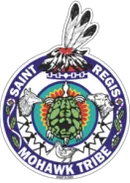AKWESASNE — The Saint Regis Mohawk Tribal Council is joining an increasing number of advocacy groups, tribal communities, agencies, and others who are calling for the full accountability of Indian Residential Schools. The call for a complete review and investigation grows louder, as the remains of more Indigenous children continue to be discovered across Canada and the United States.
What started with the discovery of 215 unmarked graves of First Nations children at the Kamloop Indian Residential School in British Columbia, Canada in May 2021 has increased to 1,363 as of June 23rd. With 139 residential schools located in Canada and 365 Indian Boarding Schools in the United States, the full extent of the atrocities that were committed against Indigenous children has yet to be known.
Beginning in the early-1800, both Canada and the United States forcibly removed Indigenous children from their families and communities in an attempt to assimilate them into western society. At distant schools, Indigenous children were separated from everything associated with their cultural identity, which often included being violently reprimanded for speaking their own Native language as they struggled to learn a foreign one.
According to Canada’s National Truth and Reconciliation Commission, approximately 150,000 Indigenous children were abducted and relocated to residential schools between 1883 until 1996. It is estimated that up to 6,000 of the children who were forced to attend Canadian residential schools went missing. This includes the remains of 751 Indigenous children that were discovered on June 24th at the former-Marieval Indian Residential School in Saskatchewan, Canada.
With the majority of the residential schools located in the United States, it is estimated that upwards of 450,000 Indigenous children were forced to attend — though there is no clear estimate on the number of children who never came home. It is clear however, that the abuse and violence committed against them during their time at the schools have contributed to the intergenerational trauma that Indigenous communities continue to experience today.
As we continue to learn the full extent of the residential school atrocities, the Tribal Council is demanding a full investigation and accountability for the shared policies of genocide that took place across both countries. In the meantime, we extend our hearts and our services to residential school survivors and to those families whose loved ones never came home.
If you need support during this difficult time, please call the National Residential School Crisis Line at 1-866-925-4419, SRMT Mental Health at (518) 358-3145, or SRMT After Hours Crisis Center at (518) 651-4475.
We know that the process of healing does not come easy, but we hope that by coming together during the difficult time that we can help each other as we learn more about this painful part of our people’s history.
#####
The Saint Regis Mohawk Tribal Council is the duly elected and federally recognized government of the Saint Regis Mohawk People.

